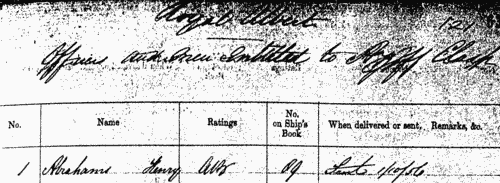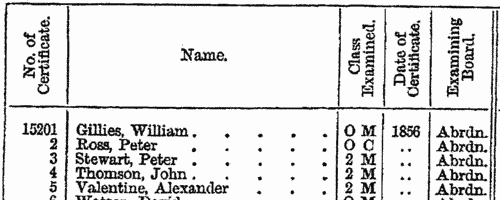Purse Surname Ancestry ResultsOur indexes 1845-1865 include entries for the spelling 'purse'. In the period you have requested, we have the following 5 records (displaying 1 to 5): Buy all | | | Get all 5 records to view, to save and print for £34.00 |
These sample scans are from the original record. You will get scans of the full pages or articles where the surname you searched for has been found. Your web browser may prevent the sample windows from opening; in this case please change your browser settings to allow pop-up windows from this site.  Sailors and marines on H. M. S. Royal Albert in the Crimean War
(1854-1856) Sailors and marines on H. M. S. Royal Albert in the Crimean War
(1854-1856)
Sebastopol in the Crimea was the great Russian naval arsenal on the Black Sea. A combined assault by British, French and Turkish troops resulted in the reduction of Sebastopol and led to the Treaty of Paris of 27 April 1856, guaranteeing the independence of the Ottoman Empire. By Admiralty Order the Crimea Medal was awarded to sailors and marines present during the campaign, between 17 September 1854 (the first landing at Eupatoria) and 9 September 1855 (when the allies secured Sebastopol). The sailors' medals were mostly delivered to them on board ship in the course of 1856; the marines' medals were sent to their respective headquarters for distribution. The remarks as to distribution in this medal roll therefore give more specific information as to the whereabouts of the sailor recipients in 1856 than about the marines. Her Majesty's Ship Royal Albert, a 120-gun screw steamer, took part in the assault. Four clasps to this medal were awarded to the men present in the actions at Sebastopol itself, Inkerman, Balaklave (Balaclava) and (the sea of) Azoff, but the recipients of these clasps are recorded on separate rolls, not part of this index, but indexed on this site. This index also covers the Royal Albert's two tenders, the Clinker and the Grinder.PURSE. Cost: £8.00.  | Sample scan, click to enlarge

|  Sailors of H. M. S. Royal Albert who fought in the Azoff Sea
(1854-1856) Sailors of H. M. S. Royal Albert who fought in the Azoff Sea
(1854-1856)
Sebastopol in the Crimea was the great Russian naval arsenal on the Black Sea. A combined assault by British, French and Turkish troops resulted in the reduction of Sebastopol and led to the Treaty of Paris of 27 April 1856, guaranteeing the independence of the Ottoman Empire. By Admiralty Order the Crimea Medal was awarded to sailors and marines present during the campaign, between 17 September 1854 (the first landing at Eupatoria) and 9 September 1855 (when the allies secured Sebastopol). Her Majesty's Ship Royal Albert, a 120-gun screw steamer, took part in the assault. Four clasps to this medal were awarded to the men present in the actions at Sebastopol itself, Inkerman, Balaklave (Balaclava) and (the sea of) Azoff. The Sea of Azoff (Azov, Azoph, Azof), east of the Crimean peninsula, is an arm of the Black Sea, with which it is united by the Straits of Kertch or Kaffa. This is the Azoff Clasp Roll, recording the names of the men from the ship who took part in the actions on the Azoff Sea during the Crimean War.PURSE. Cost: £8.00.  | Sample scan, click to enlarge

| Masters and Mates of Merchantmen: Certificates of Competency
(1857)
The Mercantile Navy List and Annual Appendage to the Commercial Code of Signals for All Nations, edited by J. H. Brown, was published By Authority in 1857. It includes this full list of 'Masters and Mates who have passed their examination and obtained Certificates of Competency', from number 1 to number 15816, except for those whose certificates had been cancelled. The first column gives the number of certificate; the second column full name, surname first (an asterisk before the name denotes those who are found qualified to act in fore and aft-rigged vessels only; two vertical lines denotes in North Wales fishery only; a double dagger, passed the examination in steam; and a dagger refers to honorary testimonials, details of which are printed at the end of the section. A B C D are the distinguishing letters for the four classes of Meteorological Observers); third column, class examined (1 ex, 1, 2 and 3 denote First Extra, First, Second and Third Class Master's Certificate, granted under the Voluntary Examination, by Order in Council dated August 1845; Ex C, Master Extra; O C, Master Ordinary; 1 M, First Mate; O M, Only Mate; 2 M, Second Mate; L. R. N., Lieutenant Royal Navy; M. R. N., Master Royal Navy; E. I. C., East India Company; M. I. N., Master Indian Navy.); fourth column, year of certificate (where there are two dots, this is to represent a 'ditto' to the year next above); fifth column, Examining Board (Aberdeen, Belfast, Bristol, Cork, Dublin, Dundee, Glasgow, Greenock, Hull, Leith, Liverpool, London, Newcastle, Plymouth, Shields or Sunderland).PURSE. Cost: £4.00.  | Sample scan, click to enlarge

|  Royal Engineers fighting in China
(1856-1860) Royal Engineers fighting in China
(1856-1860)
The China Medal was awarded to soldiers and sailors who took part in the prosecution of the war against the Chinese from 1856 to 1860. Separate clasps were awarded for men who had been in receipt of the China Medal of 1842; for being actually present at Canton on 28 and 29 December 1857, when that city was bombarded and finally captured; for being actually engaged in the operations which ceased with the first capture of the Taku Forts, 20 May 1858, and led to the Treaty of Tientsin; for being actually present at the capture of the Taku Forts 21 August 1860; and for being actually present before Pekin the day the gate of that city was given up to the allied (British and French) army, viz. on 13 October 1860. Several companies of Royal Engineers took part in these actions.PURSE. Cost: £8.00.  | Sample scan, click to enlarge

| Unclaimed Naval Prize Money
(1855-1902)
Various prize moneys were awarded to officers and men who served on board her Majesty's ships. For one reason or another a substantial number of these prizes, from as little as a shilling or two to as much as many pounds, remained undistributed by 1902, when this comprehensive list of the unclaimed moneys was printed: it lists unclaimed shares of prize money, slave and pirate bounties, salvage awards, parliamentary grants, gratuities and other moneys distributed by the Admiralty 1855 to 1902, but which omits moneys for service on the China Station during the war of 1856 to 1880, and special gratuities for service in Egypt (1882), Soudan (1884) and Soudan and Nile Expedition (1884-1885), for which there are separate indexes. In each case the sailor's name is given first (surname, then christian name or initials); rank or rating; ship in which serving at time of capture or award; and the amount due.PURSE. Cost: £6.00.  | Sample scan, click to enlarge

|
Research your ancestry, family history, genealogy and one-name study by direct access to original records and archives indexed by surname.
|








